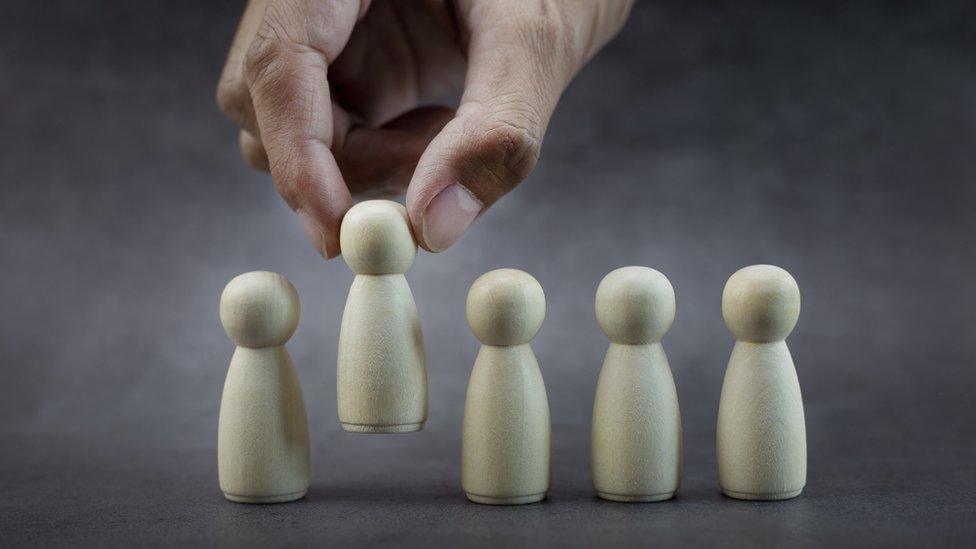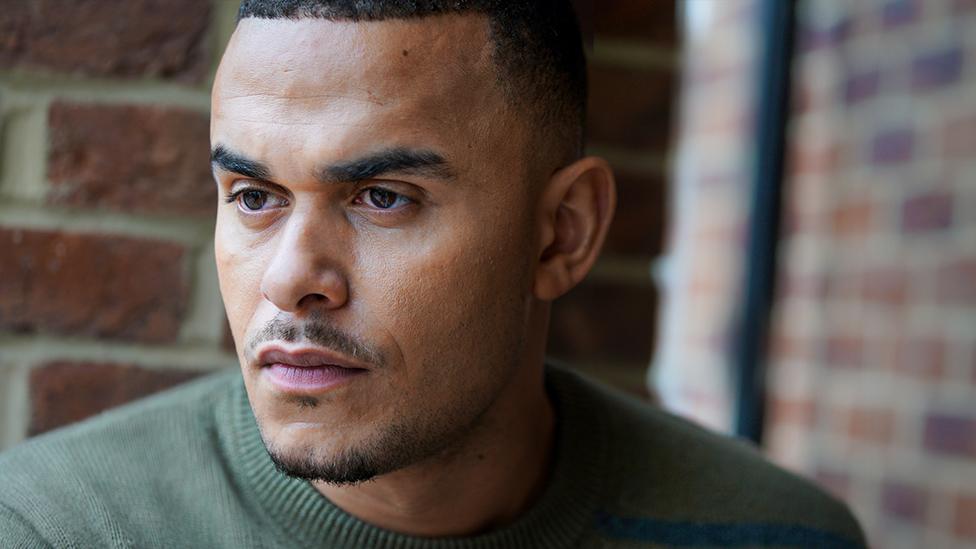'We were split up from our siblings when we went into care'
- Published

When the BBC's Ashley John-Baptiste reported on people who had been separated from brothers and sisters while growing up in care, he never anticipated that hundreds of people who'd had similar experiences would get in touch. Here he writes about the impact his story had.
I grew up in foster care believing that I was an only child - it wasn't until I was in my mid-20s that a man reached out to me on social media to tell me he was my brother.
After I shared my story, I was moved by the public reaction. So many people have told me about their experiences of being separated or estranged from siblings while growing up in care. Some said that when they were placed in care their siblings were the only people they had left, but they'd had to fight just to get to see them. Others shared how traumatic it was to be separated from brothers and sisters. And some - like me - had grown up not knowing how many siblings they even had.
I also heard from carers and social workers who'd tried to facilitate contact between siblings, but sometimes found themselves powerless to help.
My documentary, Split Up In Care: Life Without Siblings, was discussed in Parliament by the Labour MP Emma Lewell-Buck, who said that it highlighted an urgent to need to improve sibling contact for children in care, external. The film also attracted the attention of Josh MacAlister who is leading a review of the care system in England, and the Children's Commissioner for England, Dame Rachel de Souza.
Here are some of the stories of sibling separation that have been shared by readers. Some names have been changed.

Melanie, 27, was taken into care as a toddler, along with her seven siblings.
My parents were both either on drugs, in prison, or missing, so my older siblings had brought me up since birth. The girls did all the cleaning, cooking, feeding, nappy changing, tried to wash us, and tried to make sure we went to nursery and school. They did what they could, but obviously they were children.
An accumulation of things led to us being taken into care - neglect, child abuse, sexual abuse in my house, and drugs and alcohol.
For six months, all eight of us were together in a residential care home. Then my six half-siblings were placed in six different foster homes, while me and my "full" sibling were put in a foster home together. After being removed from the care home, I didn't see my older siblings for about 20 years.
We were supposed to have letterbox contact when I was adopted but my parents stopped doing it. They said it was really difficult because there were so many siblings, and you don't know what to say - do you send a picture of you on holiday at Disneyland Paris to all these kids in care, or just tell them you're fine?
When I was at university I made a fake Facebook account to try to contact my siblings. I was embarrassed and didn't want them to know where I lived.
I've spoken to a lot of them on Messenger but have only met one. It was really overwhelming and intense. She remembered me more because she was older. She said how much she loved me and how nice it was to have a sister, whereas I didn't feel like I had that relationship with her, so I shut it down very quickly.
I decided to try again when I was a bit older and had more support, so we're hoping to meet this summer for the second time.
I think they find it hard to talk to me, and see me as someone who's got a bit of money and had a nice life, like I don't understand what they have gone through - which is true to an extent. In their position I would be resentful too.
I feel really guilty because I'm one of the only ones who was adopted, the only one who went to university, and the only one who is not living the same type of life that we were brought up in. Four or five of my siblings have kids that have been put into care - it's a continuous cycle.
As far as I know my birth father is dead. I know he went to prison - he did awful things - so his family had nothing to do with him. My mum is still alive. I've tried hard to have a relationship with her but we don't get on.
In the past, I found it very hard to make friends or build close bonds because I'd lost everyone in my life. I've had a lot of therapy to help with that. I've wanted kids for a long time, but I'm really hesitant to become a parent - I'm scared to replicate what I've seen.

Catherine, 27, always knew she was adopted but didn't know much about her background.
Last Christmas, I paid an investigator £370 to find my birth mum - I had always wanted to do it. At first she said I wasn't her daughter - it was horrible. I sent pictures and letters to try to reach out to her.
Then I found out I had a brother who was only a few years younger than me from the same birth mother. My whole life I had thought I was an only child.
I felt sick. I hadn't told my adoptive parents and I was holding in all these emotions. And then my brother phoned me and we bonded straight-away.
He knew nothing about me. He was raised by my birth mother and moved in with his dad when he got older - we have different dads. It was a rollercoaster of emotions.
My birth mum has a lot of mental health issues and is not privileged. I know my birth father's name but don't know anything else about him. From what I've been told he was very abusive to my birth mother and I think she wanted to keep me but there was no way that she could. She's obviously gone through a lot.
I'm still not ready to meet my brother. I'm still processing everything, dealing with the emotions.
Knowing my real mum has made me gravitate towards my adoptive family and appreciate them even more because of what my life could have been like.


Thousands of children have been separated from their brothers and sisters by the UK care system. Ashley John-Baptiste hears from those whose lives have been changed forever.
Watch Split Up In Care: Life Without Siblings on BBC iPlayer

Anita, 77, and her younger sister were put into care at the ages of four and two. Their father walked out in 1949, after their mother had become pregnant with someone else's child. Their baby brother was put up for adoption.
My sister and I were together in a foster home for a while, but we didn't know anything about our brother for another 65 years.
We were moved to a children's home that could take two sisters, then we were separated in foster care but lived almost next door to each other for a while. My sister was sent back to care when the family she was living with discovered they were expecting a baby of their own. After that I didn't see her again until I was 12.
The foster home I was in was quite abusive. School was my saviour. The headmaster wanted me to go to university, but my foster mother said I couldn't stay on to sixth form. There was a big row.
When I was about 26, my sister's husband went to London on business and went to the address my mother had lived at - it was on my birth certificate. He found my mother and some other relatives. Out of the blue I then got a letter which said, "Hello, I'm your mother," and a photograph.
Eventually, I went to meet her. She came towards me and said, "Hello, dear." No kiss, no cuddle, nothing. We never got close. She had schizophrenia, and I suspect that a lot of her mental problems stemmed from losing all her children. She died in 2001.
My dad died in 1994 - I could have met him. The one thing I remember about him is from when I was very, very little. I think he was looking after us while mum was in hospital having our brother. I remember him saying, "Hold tight on the pram, there's a good girl." And then he disappeared behind a door and I never saw him again.
Six years ago, my sister suddenly decided she would like to know about her background. A social worker spent a month with her going through her file. That was very traumatic, but along the way, the social worker said, "Would you like us to try and find your brother?"
Days later, the social worker rang. "We found your brother, he is absolutely over the moon. He thought he had been thrown out from a loving family and nobody wanted him."
We talked on the phone and cried and cried.
When we met, I was able to show him a photograph of our mum. He is rather special - very entertaining, very humble. He was adopted by a nice couple, but his father died when he was nine, and his mother went into depression. He left school early, then joined the circus. He's been all over the world as a clown. In 1991, before we knew him, I took my son to the circus in Derby, and I learnt later that my brother was one of the performers.

Davina, 19, has five younger siblings - she was nine when they were all placed into care. They were immediately split up. Davina was eventually fostered, but some of her siblings were adopted, while others got a special guardianship order, which is in between fostering and adoption.
They say they encourage contact with the birth family, especially siblings, but that didn't really happen. When my siblings went off to their new families, I lost contact with them for a few years because of a lack of communication in social services and poor management.
I still have a relationship with my last foster family, who I absolutely adored. I'll go round for dinner and we do Christmas and birthday presents.
Just before Christmas, the parents of my siblings decided it was time to push social services to organise contact. It was three years since I'd seen my siblings last and I don't think I'd mentally prepared myself. I expected a little toddler to run into my arms again and that wasn't the case - they're taller than me now.
We've all had very different experiences, but we've all felt the anger and upset.
I haven't seen all my siblings together yet because of Covid, but that would be my dream, I'd love us all to be together again.
I was ashamed for many years, but being in care has made me the person I am. I've turned out a much better person for it.
As told to Sarah McDermott.
You can follow Ashley on Instagram, external or Twitter , external